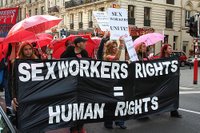Porn: no to censorship

“Women are agents, and not merely victims, who make decisions and act on them, and who desire, seek out and enjoy sexuality”. (Caught Looking: Feminism, Pornography and Censorship)
While listening to the recordings from the Andrea Dworkin Commemorative Conference which happened last month, I was struck by the talk given by FAC (Feminists Against Censorship) speaker, Alison Assiter.
Assiter’s talk broke the cardinal rule by criticising Andrea Dworkin’s stance on porn. One audience member denounced her by saying, “You hate radical feminism more than you hate violence against women”.
Listening to the interchange taking place threw me back to the late 80s where I too was verbally attacked for not taking a pro-censorship position on porn and that it was “obvious” from my views I had not experienced violence (wrong!). Wasn’t I allowed an opinion which deviated from the “official line”? Isn’t feminism about a democratic and open exchange of ideas? I joined FAC 18 months later.
The issue of censorship is back on the feminist agenda (did it ever go away..?) or should I say dominating the feminist agenda. Again, like the debate on prostitution, porn has been heatedly discussed on some of the feminist blogs, with obvious differences of opinion. Interestingly, I also read a piece in Scottish Socialist Voice (Scottish Socialist Party paper) linking rape to porn.
When I listen to younger feminists trot out the anti-censorship line on porn I feel a sense of déjà vu and the feeling that an honest and open debate is once again stifled.
Andrea Dworkin argued that women will be free when porn no longer exists. Women, again similar to prostitution, are powerless, passive one-dimensional victims of patriarchy. There is no account of women as sexual beings with their own desires, needs and enjoying sex.
The most glaringly obvious omission from the pro-censorship position is the lack of recognition of the women who work in the porn industry. What about their demands?
Dworkin and MacKinnon drafted city legislation in Minneapolis and Indianapolis (which eventually were thrown out due to being unconstitutional). It defined exhibition of porn as well as the harm porn does. How do you define harm? The organisation Object also challenges porn on the basis of harm and not “morality”, “taste”, and “decency”. The problem with that argument is that you will be making alliances with the very people who view sex overall as smut and indecent.
Dworkin and MacKinnon seemed to have had no problem with making alliances with homophobic, racist misogynists who championed rolling back the gains the women’s movement had made (Jesse Helms, Coalition for a Clean Community, Citizens for Decency and so on).
Object also argues for “mechanisms to allow the appropriate regulation of the media”. I assume that means censorship?
Another argument used by the pro-censorship supporters is the link between rape and porn. Much of the research is inconsistent and contradictory, especially considering pro-censorship favourite, Edward Donnerstein, has complained that his work was misrepresented by Dworkin and MacKinnon.
Recently, the National Federation of Retail Newsagents published voluntary guidelines regarding “offensive materials”. The “lads mags” and newspapers like the Daily Sport could end up on the top-shelf. The Daily Mail offends me with its racist bilge about “bogus” asylum seekers but hey, I don’t see them being relegated to the top shelf, along with the Sun newspaper. Will these guidelines make women that less oppressed? Out of sight and out of mind?
Porn may reflect the sexism in society but it didn’t create it. Radical feminism has held up censorship of porn as the panacea for the oppression women experience in society. I hate the way women are objectified and degraded in porn but it is important to challenge, question and debate these sexist images and dominant sexual ideologies in a patriarchal capitalist society and not seek censorship. Do we need to be “bound and gagged” by censorship laws? No, I don’t think we do.
Finally, feminism for me, is about being able to democratically debate, discuss and question without censoring ourselves. That is liberation. Personalised attacks and insults destroy the very fabric of our movement.


